Our News, Your News
By Nicky Harman, December 10, '18
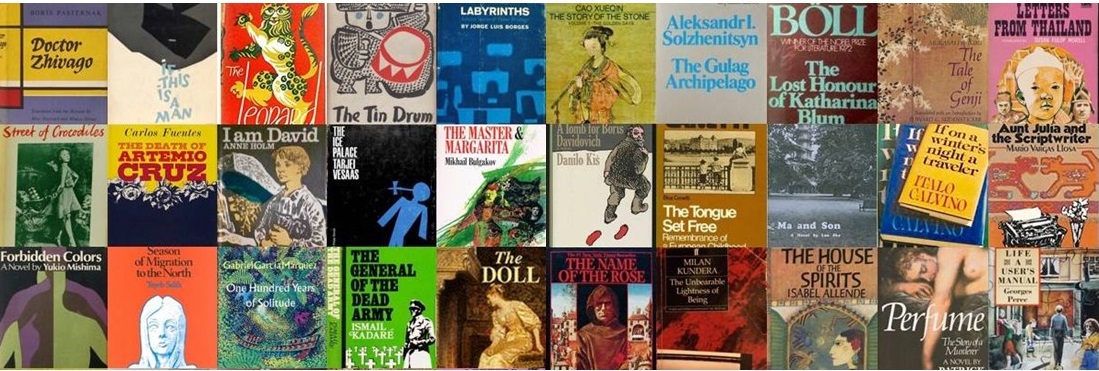
The brilliant Charlotte Collins has chosen at least one great translation for each of the last 60 years. Read about them here or on Twitter #TA60, or on Charlotte's Facebook page. And keep following until next June, and like and share, of course. She has unearthed some fascinating nuggets of information about some classic novels.
By Nicky Harman, December 9, '18
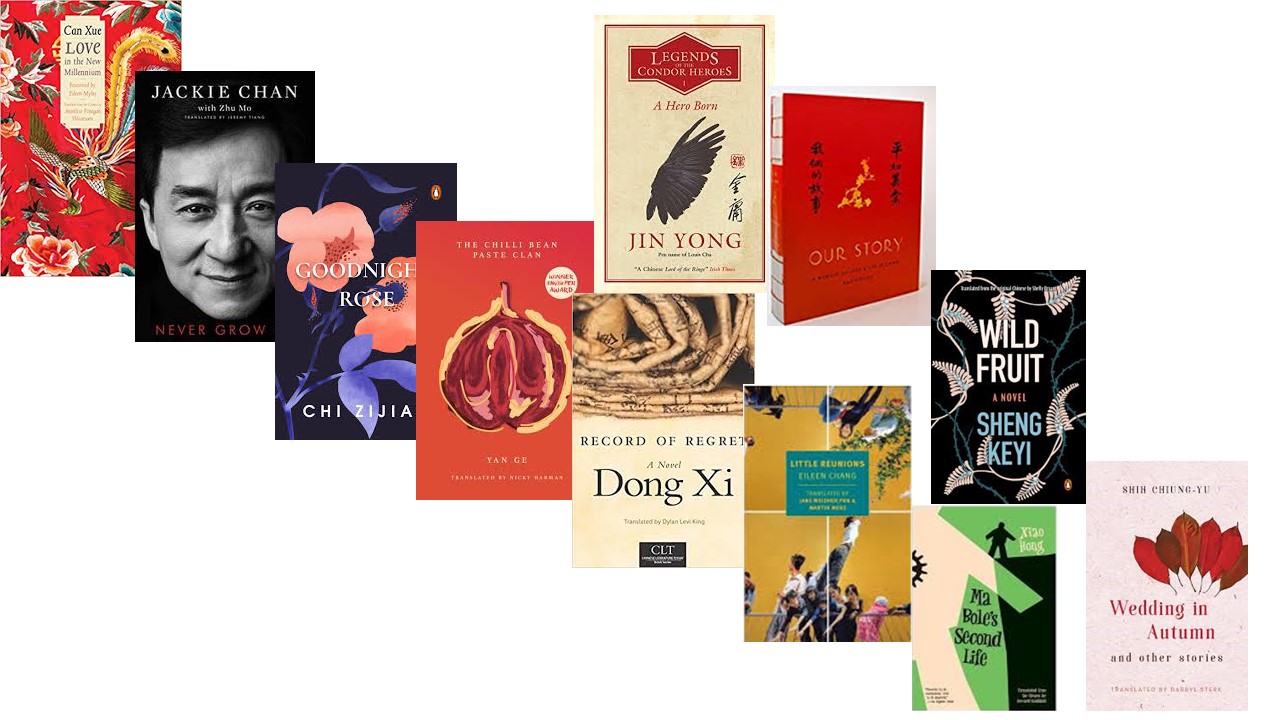
We say this every year, but this really is a bumper crop. From classics to contemporary literature, poetry to scifi to short stories and a beautiful graphic memoir (Rao Pingru), our list this year has nearly forty novels or other book-length works, and six poetry collections.
And some of last year's books have won or been listed for prestigious prizes:
Remains of Life by Wu He, tr. Michael Berry (Columbia University Press), 2017, was shortlisted for the Best Translated Book Award 2018.
Notes of a Crocodile, Qiu Miaojin, tr. Bonnie Huie (New York Review Books), was longlisted for the 2018 PEN Translation Prize and won the 2018 Lucien Stryk Asian Translation Prize.
The Stolen Bicycle, by Wu Ming-yi, tr. Darryl Sterk (Text Publishing Company), was longlisted for The Man Booker International Prize.
Click Roll-call of Book Translations from Chinese in 2018 for the full list.
And finally, our previous years' lists start here.
More…

The TSLR has nominated works by Sheung King, Xiao Yue Shan, Lynn Zhao, Francis C. Macansantos, Andrena Zawinski, Xu Xiaobin and Nicky Harman for The Pushcart Prize
Alexander Dickow reviews two quite different books of Chinese poetry in translation: Li Shangyin 李商隱, translated by Chloe Garcia Roberts, Lucas Klein, and A.C. Graham (NYRB), and October Dedications, the selected poetry of Mang Ke 芒克, translated by Lucas Klein with Yibing Huang and Jonathan Stalling (Zephyr/Chinese UP).
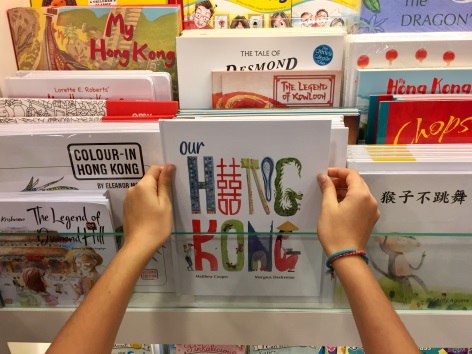
The books that will be the focus of our attention will be English language books for children and young adults that are either written by authors who have lived in Hong Kong, or were produced in Hong Kong, or follow a story set in Hong Kong.
By Nicky Harman, December 3, '18
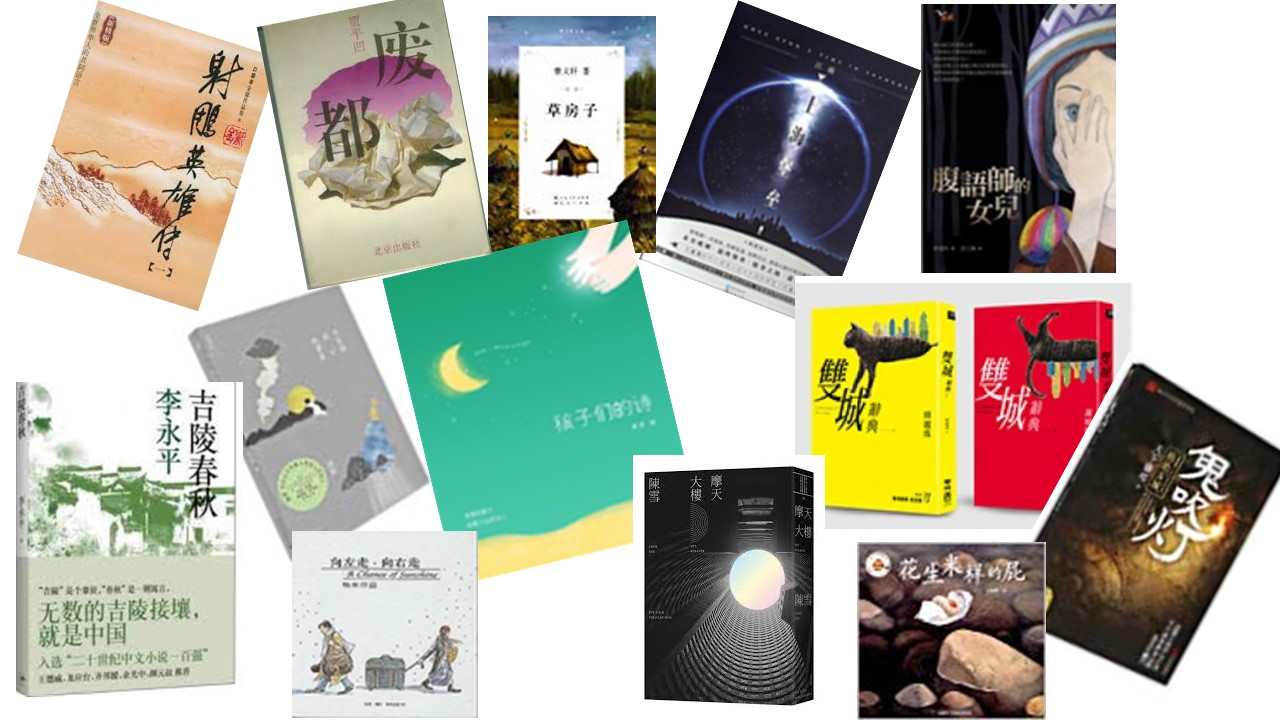
Paper Republic has produced some new resources, for general readers and for librarians. Resources for readers provides guidelines, links and suggestions, all on one page. The resources for Librarians, intended especially for librarians in schools and community groups, has two sections: Stories in the Original Chinese for Schools and Libraries and Chinese Books in English for Schools and Libraries. Check out the clickable links on the left-hand side of this page, under Resources
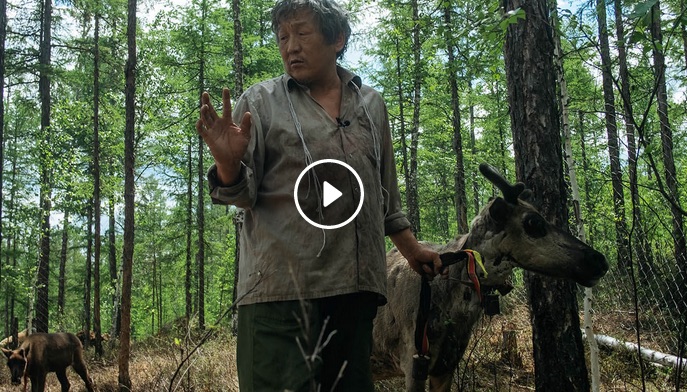
"LIKE THE GHOSTWRITER, THE TRANSLATOR MUST SLIP ON A SECOND SKIN."
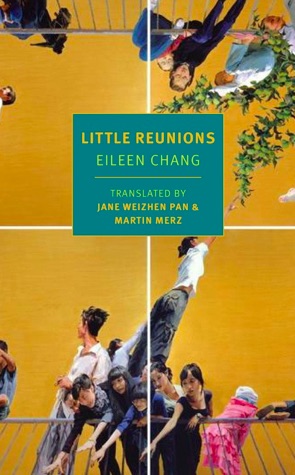
But it is hard to argue that Chang’s work is a simple rejection of the notions that history affects people’s lives or that people often ponder their place in the larger scheme of things. Perhaps the best way to characterize Chang’s attitude toward historical consciousness is not as a pat rejection, but instead a speculative probing of the margins of this consciousness as it ineluctably affects her protagonists. Rather than the patently visible epic vicissitudes of history, Chang looks at such consciousness as if looking at the negative to a film.
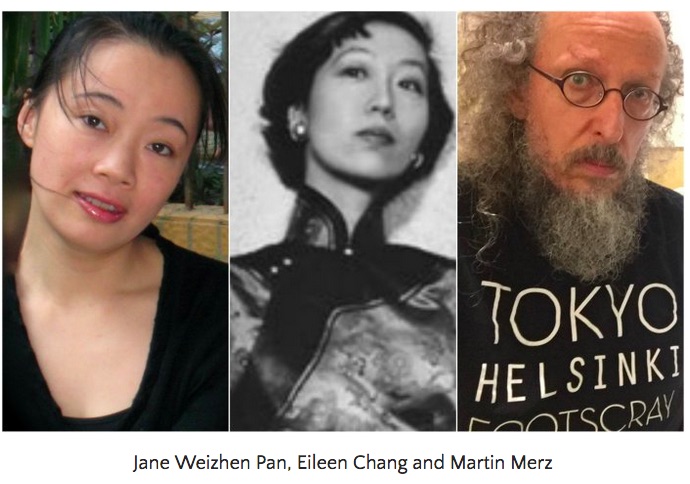
As translators, we believe it’s vital to comprehend the context of the story and convey the author’s message holistically, both spoken and unspoken, rather than simply translating the text on a word-for-word level.
Paris Review on Can Xue's Love in the New Millennium
Translated from the Chinese by Isabelle Li.
"The tick-tock of time dripped from clocks like rust stains, dot by dot, covering the entire iron piece, finally obscuring it. The murky, red-brown rust turned darker and darker until the iron could no longer be seen."
By David Haysom, November 18, '18
For anyone in Guangzhou or Shenzhen over the coming week, don't miss the 3rd EU-China International Literary Festival! We have leading European authors from Cyprus, Denmark, Finland, Malta, the Netherlands, Romania, Poland, Sweden, and the UK, plus 40 great Chinese writers. An array of wonderful discussions lined up in a week jam-packed with literary events. Check out the full programme here: http://eu-china.literaryfestival.eu
In mid-October, I was swiping through the news when a headline caught my eye: “RTHK’s Below the Lion Rock 2018 Season Opener to Revisit Causeway Bay Books Incident.” That may read like standard entertainment news, but it was anything but. RTHK – a government-financed channel – had adapted one of the most sensitive events in recent Hong Kong memory.
The narrator of the story, who is the absent daughter of the main protagonist Xue Shengqiang, describes Pingle as a “piddling little town, where walking from East Street to West Street only took fifteen minutes.” And Pingle was all about mala, the numbing heat born of mixing chilli bean paste and Sichuan peppers. The narrator explains that the “townsfolk grew up with a hole in their tongues. In fact, they were almost born eating Sichuan pepper powder.” And for Xue Shengqiang, mala is a key thread in his story––the sweat it induces, the sex it inspires, and the fiery temper and constant stream of expletives it arouses. They’re all connected. As the omniscient narrator explains it, “Dad used to pepper his love-making with a lot of swearing.”
A cultural venue run by a nonprofit organization with close ties to the Hong Kong government has abruptly canceled plans to host two events featuring an exiled Chinese writer [Ma Jian, author of China Dream], in what some saw as the latest sign of eroding freedoms in the city.
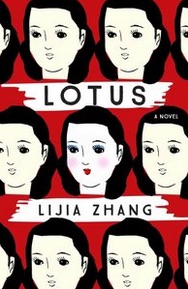
by Graham Earnshaw, who translated The Book and The Sword.
An exhibition by a dissident Chinese-Australian cartoonist in Hong Kong has been cancelled by its organisers over what they said were threats from China.
Badiucao's work focuses on rights abuses and satirizes President Xi Jinping.
His show was part of events examining free speech in Hong Kong since the 2014 pro-democracy "umbrella" protests.
It’s a shame, then, that ghost stories now struggle to find a readership in China. In 2008, the government — concerned about the spread of “superstition” — added supernatural elements to the list of content banned in films, books, and other media...
Mo, together with a group of elite Chinese authors, will represent China in the book fair. They were welcomed by Algerian Minister of Culture Azzedine Mihoubi at the international airport of Algiers.
In Invisible Valley, protagonist Lu Beiping’s life is governed by taboos, rules, conventions and fears. He is subjected to the Chinese tradition of a “ghost marriage” when the foreman pairs him off with his deceased daughter. After the foreman gives him a plum job in isolation tending cattle on the fictional Mudkettle Mountain, Lu Beiping encounters a clan of polyamorous “driftfolk,” whose way of life helps him escape the prevailing Maoist ideology of the time.
Ce roman a été publié à Taiwan en 2015 et comme la grande majorité des œuvres de Yan Lianke, n’est pas autorisé en Chine. Le livre a été couronné en 2016 par le prix prestigieux attribué tous les deux ans à un roman écrit en chinois par un jury international à Hong Kong (2). Une traduction française, « La mort du soleil » par Brigitte Guilbaud qui, avec Sylvie Gentil, récemment disparue, a traduit avec talent les romans de Yan Lianke, sera disponible dans quelques mois.
Paper presented by Wenqian Zhang, at IPCITI conference, Manchester, 25-27 Oct 2018
“We are all singing from the same hymn sheet,” remarked the pioneer of Translation Studies at the end of our conference; among young translators particularly, there was a “fervor,” a “zealotry,” that was admirable and encouraging.
This desire for unanimity and solidarity is understandable, and no doubt, at a deep level, we do all share a passion for literary translation and a wish that the practice thrive. This is why we invest so much time in learning our languages and working on our writing—so that our translations will be better. It is the logic behind every course that teaches translation: that one can improve. If someone is not happy with the hymn sheet, or with hymn sheets in general, let’s hear them.
A critical review of Na Duo's All the Way to Death by Angela Qian in the LARB China Channel. By coincidence it was published on the same day as Tim Parks' critical piece "Why Translation Deserves Scrutiny" in the New York Review Daily.
By Helen Wang, October 23, '18

In 2016 Minjie Chen, Anna Gustafsson Chen and I started a blog/web-resource Chinese Books for Young Readers. Here's a list (with weblinks) to the first 72 posts. Thanks to everyone who has helped us along the way. Keep following! (twitter: @cb4yr)
-- The China Shanghai International Children's Bookfair is coming up (9-11 November).
According to Dr. Tammy Lai-Ming Ho,
Hong Kong literature has for too long been relegated to a secondary position, or even worse—it is as though the city is incapable of producing significant literary works and writers of note. Hong Kong poetry is to many perhaps an even more abstract and chimerical concept. Xi Xi’s poetry, at times whimsical and at times serious, speaks to the character of the city and its people. Her poems also demonstrate how stories of a city can be told through narratives that are at first glance insignificant, allegories and fairy tales instead of grand statements. Feminine, tender, witty, observant, and capable of tugging at the heartstrings, Xi Xi’s poetry reminds us Hong Kong poetry should not be ignored in any discussion.
“No one here has actually read anything I’ve written, or knows that my books are banned. To live in China in 2018 is to inhabit a reality that makes you question the very nature of reality.” The absurdity of the evening’s events seemed, ever so slightly, to please the author. “The people we met today, they know the name Yan Lianke and that he’s a Henanese who’s come by a bit of fame,” he said. “But, in their minds, I might as well be a character in a story.”
There's a little song in Bronze and Sunflower which took ages to translate. It's the one about the woman and the little girl, with their different hairstyles, swapping places. The original Chinese is loaded with detail, but is also like a nursery rhyme. I couldn't fit all the detail into similarly light rhyme in English, and in the end, I decided to go for the light rhyme and compromise on the detail. Our two dogs enjoyed extra long walks at that time, as I kept repeating things over and over in my head until they began to fall into place!
“Originally written as a nightmare, it is based on events that are happening in reality and have affected me,” Sheng told me. “Metaphor disease is defined as the excessive use of metaphors. The fear of uncontrolled speech and knowledge-dissemination prompted the ruling class to create a new centre for ‘healing patients’, which is actually used for controlling people. Creators of metaphors, and metaphors themselves, are imprisoned.”
By Bruce Humes, October 2, '18
The Guardian reports that former secretary of state and Massachusetts senator John Kerry made the following comment on the current rush to vote on the nomination of Brett Kavanaugh to the US Supreme Court:
“There’s no reason in the world to be bum-rushing this nomination.”
How to render "bum-rushing" as used here?
By David Haysom, October 1, '18

We are delighted to announce a new series from Read Paper Republic: China Dispatches. Over the next month we will be publishing a selection of non-fiction pieces chosen from OWMagazine (单读). This will be a three-way collaboration between Paper Republic, OWMagazine, and the LARB China Channel. Each of the stories will be appearing first on the China Channel, then published here on Paper Republic one week later. We’re very excited about our initial run, which includes some of our favourite writers as well as some new voices, and we’re sure you’re going to enjoy these dispatches from different corners of China.
The first installment – “Three Sketches of Peter Hessler” by Wu Qi, translated by Luisetta Mudie – is available to read on the China Channel now!
"No one, wise Kublai,” says Marco Polo in Italo Calvino’s Invisible Cities, “knows better than you that the city must never be confused with the words that describe it.” In Atlas: The Archaeology of an Imaginary City, Hong Kong’s Dung Kai-cheung writes, “All places are misplaces, and all misplaces are misreadings,” and “The prerequisite for the setting of boundaries on maps is possession of the power to create fiction.”
Welcome to a true life inspired account of passions set largely in the luxurious and exclusive confines behind the embassy’s steel gate in Beijing’s Sanlitun district. This is not merely the stark diary of the carnality and spirit of a blacklisted female writer in China. It also delves into the minds of the over-sexed, conflicted European men who populate the booming 21st-century capital, and the dark side of their relations with Chinese women who flock to them like moths to a white-hot light bulb.
From Leys' The Chairman’s New Clothes: Mao and the Cultural Revolution:
The author of this work…was impelled—by the weight of evidence thrown up in the texts, facts and personal accounts which assailed him daily in Hong Kong throughout the years of the “Cultural Revolution”—to cry out, like the child in the fairy story, “But the Emperor has no clothes!”
For commercial rather than political reasons, Mr. Zhou’s literary agent here also made changes in the English-language version of the book, translated by Zac Haluza. The action now takes place in Chengdu, the capital of Sichuan Province, not Yangzhou or nearby Nanjing, the cities Mr. Zhou said he had in the back of his mind when crafting the story. The assumption was that Chengdu, which is best known for pandas and spicy food, would be recognizable to foreign readers and give the drama a more visceral feel, Rob Bloom, Mr. Zhou’s editor at Doubleday, said in an email.
周浩暉的美國文學代理人出於商業原因,而非政治原因,也對該書的英文版做了些改動,英文版由扎克·哈盧扎(Zac Haluza)翻譯。英文版的故事發生在四川省會成都,而不是揚州或鄰近的南京。周浩暉表示,他在構思這個故事時,頭腦中一直想的是這兩座城市。周浩暉在雙日出版社的編輯羅布·布魯姆(Rob Bloom)在接受電子郵件採訪時表示,這是出於這樣的考慮:以熊貓和辛辣食物聞名的成都為外國讀者所熟知,更可能會讓讀者產生身臨其境的感覺。
“This child was a nobleman in a former life. Nobles may come calling, but they do not linger. In this child’s fate, there is death by water, by metal, by earth, and by wood. There is no death by fire.”
By Nicky Harman, May 13, '18
here
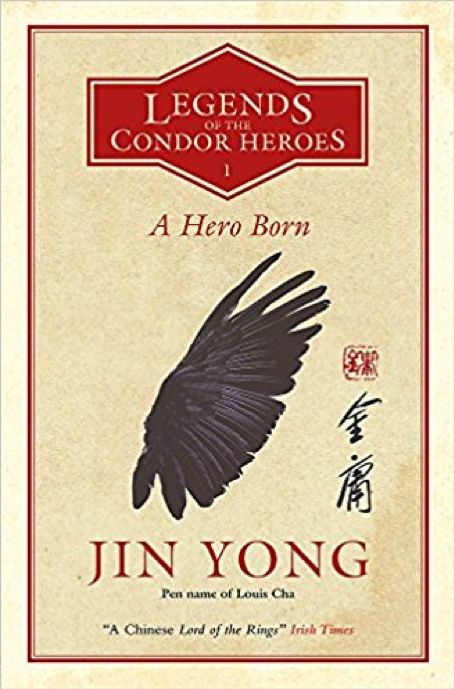
Lee and Rob got the chance recently to sit down with Dylan King, a scholar and translator of Chinese literature. In this podcast the three talk about the eccentricities and fascinations of post-Cultural Revolution fiction, and dive into Dylan’s recently-published English translation of Record of Regret, Dong Xi’s beautiful, and darkly humorous, account of a countryside family during and after the Cultural Revolution.
The subjects of “Dead Souls” were condemned in the Communist Party’s “anti-rightist” campaign in the 1950s. Like Ms. He, they were imprisoned, enslaved and starved in “re-education” camps like Jiabiangou in the Gobi Desert.
Article is bilingual (Chinese and English).
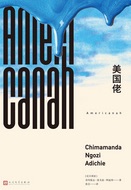
Few avid Chinese readers of fiction can name an African author or novel, and those who do often cite “Things Fall Apart,” the highly acclaimed novel by the Nigerian writer Chinua Achebe that portrays the tragic encounter between the Igbo tribe and British colonialism. It was first published in Chinese in the 1960s and has been reprinted countless times since. While literary circles in Africa no longer worship at Achebe’s altar, China’s literary establishment continues to trumpet him as the reigning “father of African literature,” almost to the exclusion of emerging authors.
One-stop, multi-media, whirlwind history of rap in China, complete with 10 catchy videos, and bilingual lyrics -- with insights into how the Party is busy co-opting this art form.
Anna Holmwood to speak at Storydrive (故事驱动)
(Beijing Jun 1, 2018 in Chinese & English)
为什么我翻译了《射雕英雄传》
Why I Translated Legends of the Condor Heroes
Away from the reach of the state, at least in his adult life, Tharlo’s seemingly only link with material modernity is his motorbike and his radio. But a new rule has decreed that all citizens of the People’s Republic of China must possess an identity card, including those living in such remote territories as Amdo (north-eastern Tibet, current Qinghai province).
The state’s edict finally reaches Tharlo, and the film follows him over a period of a few days, caught between two worlds: his familiar, rural, austere environment, where he takes care of three hundred sheep, and an nearby emerging half-Tibetan, half-Chinese town, where he has to go to complete the administrative formality.
Chinese writer Liu Zhenyun has been honoured with France's Knight of the Order of Arts and Letters for his contribution to world literature.
Anyone who reads Little Reunions will understand the origins of the stifling, hypocritical families of her fiction. Julie’s mother is a distant, pathetic stranger who treats her more like a casual acquaintance than a daughter, and her father is perpetually obscured by a haze of opium smoke. She refers to them as Second Aunt and Second Uncle—their place in the baroque family hierarchy. The endless network of cousins and concubines is less a loving family than a complicated business concern filled with unpaid accounts and threatened lawsuits. Semi-incestuous passions smolder for decades, and other secrets fester and rot.
By Nicky Harman, April 18, '18
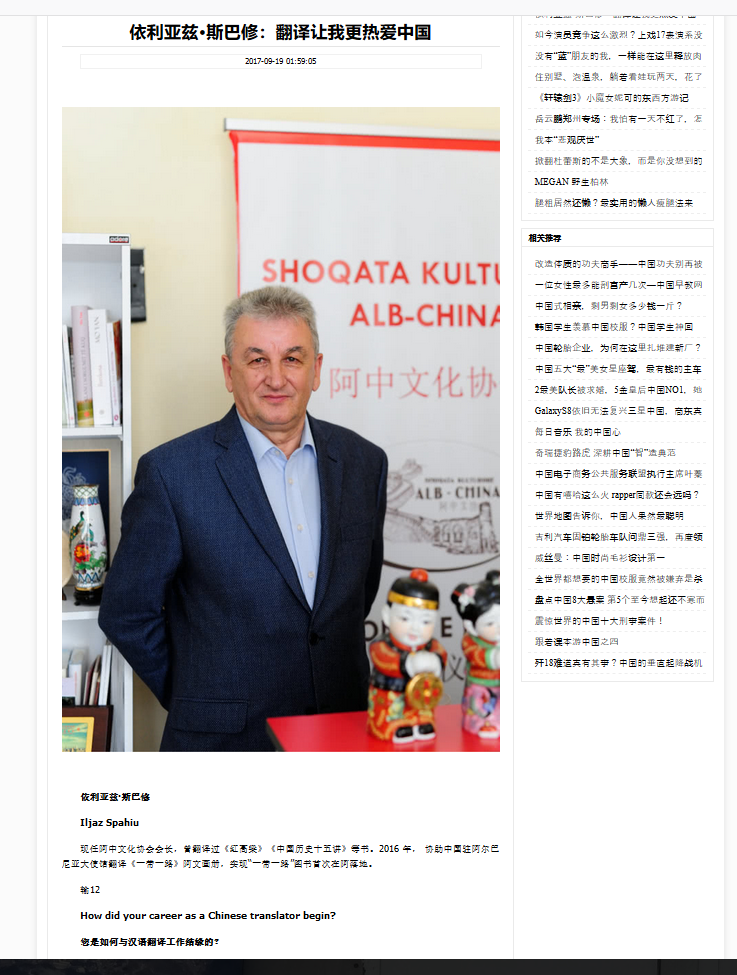
Here's a fascinating interview with Ilir Ikonomi (aka 依利亚兹·斯巴修), possibly the world's only literary translator from Chinese into Albanian: http://www.zmzjk.com/news/shizheng/201709/1952487.html
Supchina has developed a Chinese literature quiz that ranges from ancient texts all the way to modern literature. It was harder than I expected, but a lot of fun. See if you really know your Chinese lit!
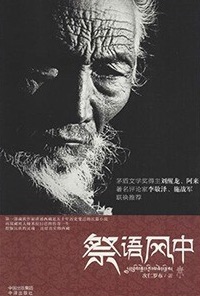
That evening I sat on a cushion in front of the open doors to Rinpoche’s room, reciting the Avatamsaka Sutra, the Thirty-Five Buddhas of Confession, and sections of the Shorter Sukhavativyuha Sutra. There, in Rinpoche’s presence, I felt cleansed of my foolish affections and jealousies. My heart was as pure as a swift-flowing mountain stream. At dawn I opened my consciousness up to Rinpoche. I felt waves of beautiful light radiating from him, like ripples emanating out over the surface of a pond, penetrating my flesh and gathering in my heart. I felt myself dissolve into the light. I saw clearly that this body was but a temporary residence. Only consciousness is eternal.
The first book of Legends of the Condor Heroes, A Hero Born, has now been brought to the English world by translator Anna Holmwood and published by MacLehose Press.
An event with Anna Holmwood in Guanghwa Bookshop, London on 18 April.
In the case of Jin Yong, the broad sweep of the story, the emotional worlds of the characters, the moral framework behind their actions: all these things translate very easily in my opinion. The parts that are more difficult are mostly in the detail, the elements of Chinese medicine or historical references that are perfectly obvious to a Chinese reader. And yet, it is my opinion that an English reader doesn’t need to understand everything on the same level as his/her Chinese counterpart. I would rather that a translation inspires a reader to explore something further than sacrifices the energy and flow in order to make every detail plain.
By Michelle Deeter, April 15, '18
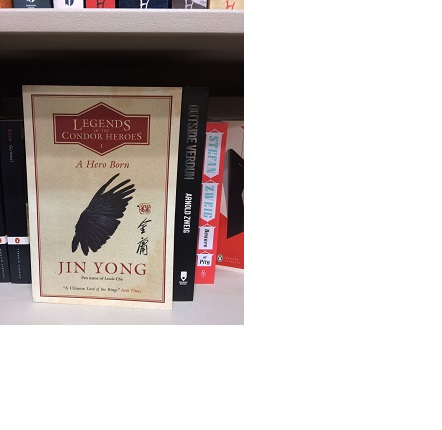
Spotted at Waterstones Manchester this week: "A Hero is Born" (Jin Yong, translated by Anna Holmwood on display in the window of Waterstones! Several excellent reviews have come out too.

















